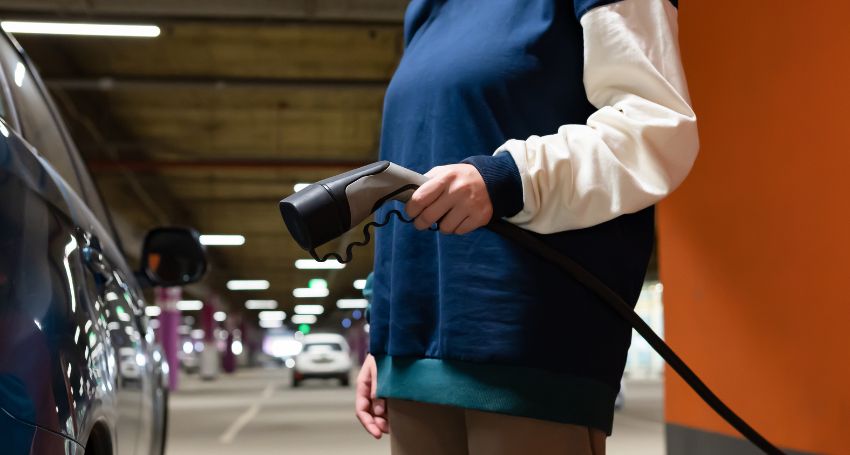
Wondering how long it takes to charge an electric vehicle? You’re not alone. Whether you’re considering switching to an EV or already own one, knowing the typical charge time can help you plan better. This guide breaks down everything from charger types to battery capacity so you know exactly what affects EV charging time.
What Factors Affect EV Charging Time?
Charging time for electric vehicles (EVs) isn’t one-size-fits-all. Several factors affect charging, including:
- Battery size – A larger EV battery will take longer to fully charge.
- Charger type – Level 1, Level 2, and DC fast chargers offer different charging speeds.
- State of charge – Charging from empty to full takes longer than topping off.
- EV model – Some EVs, like Tesla models, have faster onboard chargers.
- Temperature – Cold weather can slow down battery charging.
Knowing these factors that impact EV charging helps set realistic expectations for the time it takes to charge.
Different Types of EV Chargers
There are three main types of EV chargers:
- Level 1 Chargers: Use a standard 120-volt outlet. These chargers can charge about 3-5 miles of range per hour of charging. They are very slow and usually only practical for overnight use or plug-in hybrid electric vehicles.
- Level 2 Chargers: Operate on a 240-volt connection and are commonly installed at home or found in public charging stations. Level 2 chargers can charge about 20-30 miles of range per hour.
- DC Fast Chargers (Level 3): These are high-powered chargers that can add 60-100 miles in just 20 minutes, depending on the EV. Ideal for public charging stations and road trips.
Choosing the right EV charger makes a huge difference in how long it takes to charge an electric vehicle.
How Long Does It Take to Charge Using Level 1?
Level 1 charging is the slowest method. On average, it takes about 40-50 hours to fully charge a long-range EV using a Level 1 charger. For plug-in hybrid electric vehicles with smaller batteries, it may only take 6-14 hours.
Using a Level 1 charger is often seen as a last resort unless your daily commute is short. It’s a good backup for charging at home if no other options are available.
How Long Does Level 2 Charging Take?
Level 2 charging is much faster and more suitable for daily charging. With a Level 2 charger:
- A 60 kWh battery can take 6–10 hours to fully charge
- You get roughly 25 miles of range per hour of charging
Level 2 chargers can charge most EVs overnight, making them ideal for homeowners and workplaces. Charging times can vary depending on the vehicle’s battery size and onboard charger capacity.
What About DC Fast Charging?
DC fast chargers (also called Level 3) are the quickest way to charge your EV. They use high-powered current to charge a battery from 10% to 80% in just 20–40 minutes. DC fast charging stations are available at shopping centers, highways, and rest stops. While convenient, they can be more expensive than charging at home, and frequent use may impact battery life over time. Some DC fast chargers can charge your EV up to 80% in under 30 minutes depending on the model, such as Tesla Superchargers.
How Long Does It Take to Charge a Tesla?
Tesla models are known for their superior charging speed due to their Supercharger network and advanced battery tech. Here’s how long it typically takes:
- Tesla Supercharger: Adds up to 200 miles in 15–30 minutes
- Level 2 Tesla Wall Connector: Adds 30–44 miles per hour
- Level 1 Charger: Adds about 3 miles per hour
So, depending on the charger and Tesla model, the time it takes to charge can range from under an hour to over 24 hours.
How Much Range Can You Get Per Hour of Charging?
This depends on the charging rate and the EV model:
- Level 1: 3–5 miles of range per hour
- Level 2: 20–30 miles per hour
- DC Fast Charging: Up to 100+ miles in 20 minutes
The much range you get per hour of charging depends on your EV battery, the maximum charging rate, and even the electric vehicle charging infrastructure around you.
How Long Does It Take to Charge from Empty to Full?
Charging from empty to full isn’t always necessary, but here are rough estimates:
- Level 1: 40–50 hours
- Level 2: 6–12 hours
- DC Fast Charger: 30–60 minutes (up to 80%)
Note that charging speeds typically slow down after reaching 80% to preserve battery health.
What Role Does Battery Size and Capacity Play?
A larger battery size naturally means longer charge times. For example:
- A 40 kWh battery may take 5–7 hours with Level 2
- A 100 kWh battery might take 12–14 hours on the same charger
Battery capacity also affects how many miles you can travel on a single charge, and how long it takes to charge your EV at different speeds.
Do Plug-In Hybrid EVs Take Less Time to Charge?
Yes. Plug-in hybrid electric vehicles have smaller batteries than all-electric cars, so they generally take less time to charge. Many can fully recharge using a Level 1 charger overnight.
Since they have gasoline backup, charging is less urgent, and most owners charge them at home instead of relying on public stations.
How Does Public Charging Compare to Home Charging?
Charging at home is convenient, especially with a Level 2 charger installed. But public charging is helpful when traveling or for those who don’t have home access.
- Home charger: Lower cost, overnight charging, predictable
- Public charging station: Faster options, useful for road trips, higher cost per kWh
EV drivers should use a mix of both depending on their driving habits and access.
Can You Speed Up EV Charging?
While you can’t exceed your EV’s maximum charge rate, you can:
- Use the fastest available charger your car supports
- Avoid charging right after long drives (battery may be too hot)
- Charge during mild weather to avoid thermal limits
Using a Level 2 charger at home gives a great balance of speed, cost, and convenience for most people.
Conclusion
Charging an electric vehicle can take anywhere from under 30 minutes to over 40 hours depending on your charger, battery size, and EV model. The more you understand about how these elements interact, the more confidently you can manage your charging habits.
Whether you’re charging at home or on the go, choosing the right method will save you time, money, and give you the freedom to enjoy your EV range without anxiety.



